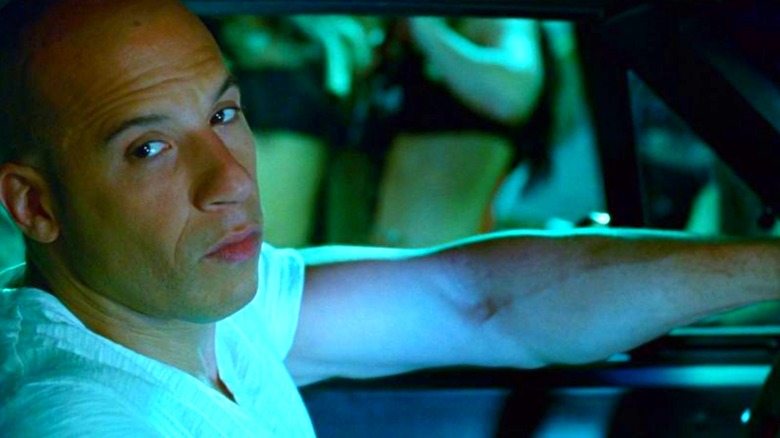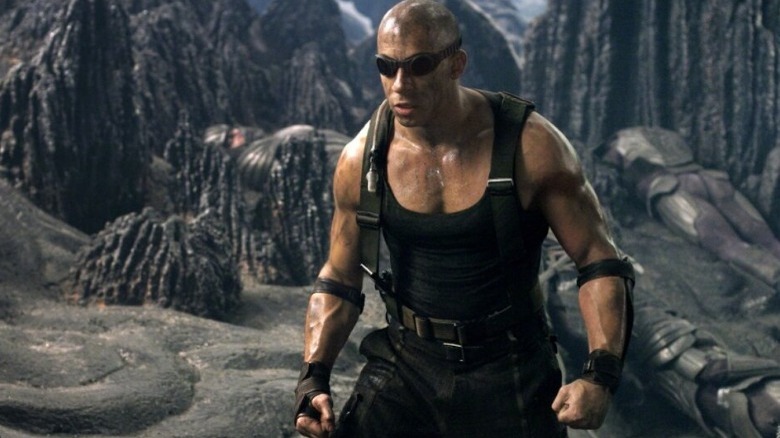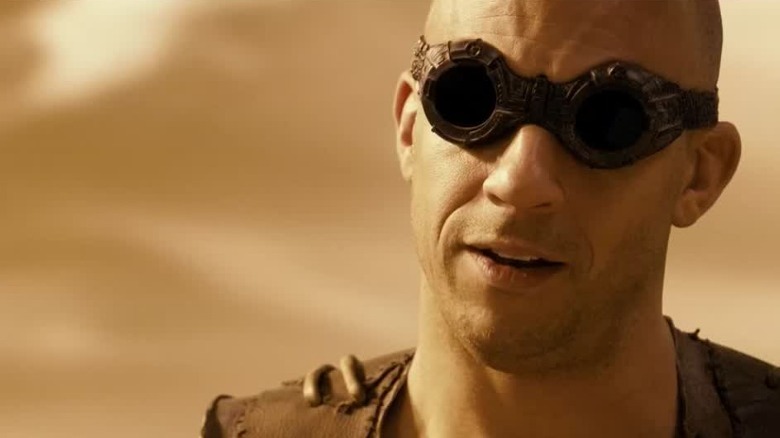How A Fast & Furious Cameo Earned Vin Diesel The Rights To Riddick
Vin Diesel's surprise appearance at the end of "The Fast and the Furious: Tokyo Drift" was a bit of a mind-blower at the time. What was initially an unconnected entry in a series about street racing turned out to bridge previously existing characters within a shared universe, predating the "Iron Man" post-credits scene by two years. Unlike the MCU, however, this wasn't at all a planned story map. It turns out this franchise-changing moment was because Vin Diesel desperately wanted to acquire the rights to his labor of love, "Riddick."
Although Diesel's Dominic Toretto has become the face of the "The Fast and the Furious" series, the actor wasn't always as enamored with the role. He turned down a $20 million offer to appear in "2 Fast 2 Furious" after reading the screenplay, deciding instead to star in "The Chronicles of Riddick," the sequel to the 2000 sci-fi action horror cult hit "Pitch Black," for around $11 million. The smaller paycheck is hard evidence that the Riddick character was Diesel's passion project. Unfortunately, the film struggled to rake in $107 million worldwide against its estimated hefty $105 to $120 million budget and cost Universal nearly $50 million in losses. Diesel's baby seemed doomed.
A Riddick-ulous failure
Still, the actor was intent on ensuring the story of Riddick would continue, even if he had to fund the project on his own instead of relying on Universal. Diesel's production company, One Race Films, was a casualty of "The Chronicles of Riddick" bomb and lacked the finances. As a result, Diesel individually funded the project himself, diverting his mortgage payments into production costs. He discussed how stressful this high-stakes situation was in the Los Angeles Times:
"I will never be able to convey the anxiety, the frustration, the fear that I was feeling before making this movie when the funding wasn't getting to where it needed to get. To where padlocks were being put on the production studio in Canada because we had insufficient funds to get going. To where I had to leverage my house."
This financial maneuvering was all for naught, however, as Universal wouldn't let Diesel even touch the "Riddick" franchise even after he offered the studio $10 million for creative control. He lamented in the same "LA Times" article:
"At that time, I felt like 'Riddick' was held in a vault. We weren't allowed to be creative with that project we had already fallen in love with. They said, 'We couldn't bear the idea of this movie being successful somewhere else. So the answer is no.' "
Drifting out of oblivion
Then a miracle called "Tokyo Drift" happened. Instead of accepting his financial offers (or paying him), Universal asked Diesel to make a cameo appearance at the end of the film. Not only did he get to keep his money just for showing his face, he also got a producer credit on the next entry in the series, "Fast & Furious," granting him significant creative control over the franchise. In Diesel's own words, it was "one of the best deals in Hollywood history." He happily said of the agreement:
"...they gave me two franchises. One, 'Fast,' which they didn't think they'd ever produce again. And 'Riddick,' which they didn't want to produce ever again."
The cameo ultimately worked out for both parties. "Tokyo Drift" wasn't banished to direct-to-DVD hell, and "The Fast and the Furious" series lived on to become a Hollywood tentpole. Diesel was forever bound to the films and became a Hollywood superstar in his own right, but he won't ever forget how close he came to ruin, calling the memories "the scariest moment of his career."


